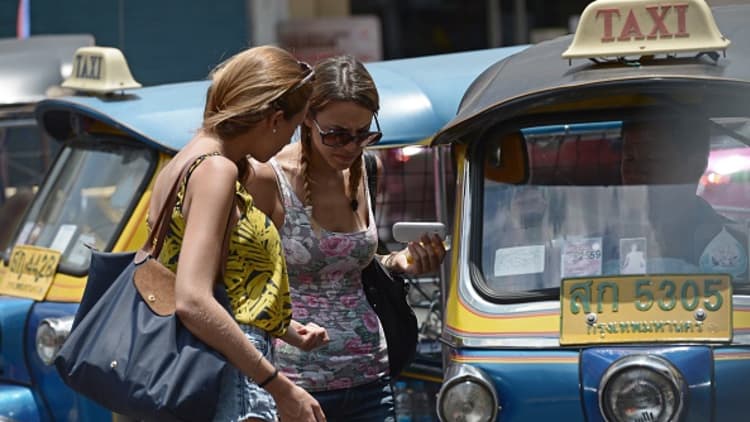Turquoise waters, world-famous cuisine and heartfelt hospitality are the pillars of Thailand's booming tourism industry. Music festivals may soon join that list of attractions.
A number of events boasting famous international artists have debuted in the Southeast Asian nation over the past few years, producing a packed year-long schedule as organizers tap into explosive appetite for electronic music.
2014 brought the launch of Wonderfruit and Arcadia Spectacular, followed by Maya Music Festival in 2015, while 2017 will see the launch of three new entrants: Mystic Valley in February, Transmission in March and Paradise Island in April. Each caters to commercial and alternative tastes across various electronic genres, including house, techno and bass.
"In Thailand, the market for international electronic music, which isn't difficult to digest and easy to become educated about, is growing the fastest," explained Pranitan Phornprapha, founder of Wonderfruit, an annual eco-friendly affair that kicks off Feb. 16 in the hills of Pattaya. "There is room for lots of content [in this space]."
Organizers say there's more than enough demand to go around and they hope the expanding festival landscape will eventually become a new tourism driver for Southeast Asia's second-largest economy.
"We definitely believe that this is a market segment that the government should look into. Not only it is bringing overnight travelers the country, generating income, and potentially increasing international and domestic flight traffic, it will improve national infrastructure to cater to tourism traffic over the long run," the Mystic Valley team told CNBC.
For now, Thai residents still make up the bulk of festival-goers. Around 40 percent of Wonderfuit attendees are overseas visitors while Mystic Valley, a 3-day event with 8 different stages, anticipates foreigners to account for 30 percent of participants at its Feb. 3 debut. But over the long-term, the number of international guests is set to spike as new festivals gain prominence—a trend seen during the early heydays of Goa and Bali, two of Asia's traditional havens for electronica.
Many foreigners come from the wider Asian region itself.
Gig Life Asia, a start-up organizing all-in-one travel packages to Wonderfruit for Singapore residents, said customer response has been fantastic since the deals launched in September. "People are now selecting music festivals to attend based on the overall travel experience," said founder Priya Dewan. "Thailand is a country with a vibrant and rich culture so that's a big factor why festivals there are appealing to international audiences."
Tourism accounts for about 10 percent of Thailand's economy, with arrivals up 9 percent to 32.6 million in 2016, versus 29.8 million in 2015 and 24.8 million in 2014, according to official data.
Visitors already traveling to Thailand will likely align their trip dates with festivals and if more events are created, they could attract a substantial number of new tourists to boost economic growth, noted Christian Lewis, Southeast Asia analyst at Eurasia and co-host of music podcast Brother Brother Brother.
Most events take place at popular holiday hotspots so organizers are likely hoping to capitalize on existing tourist flows, he noted.
Paradise Island is set in Koh Samui, a popular island in the Gulf of Thailand known for palm-fringed beaches and luxury resorts, while Transmission—a trance festival that originated in Prague—is slated for Bangkok. Mystic Valley meanwhile is located in the mountainous area of Khao Yai, a three hour drive from the Thai capital.

"Visitors from abroad are likely to combine their visit to the festival with a longer stay in the country," echoed Nicholas Motz, a guest lecturer at Chulalongkorn University's economics faculty. "The money spent as they travel around the country before and after the festival is probably more important economically than what they spend at the festival itself."
But like other tourism-dependent industries in Thailand, festivals are prone to political risk.
The death of King Bhumibol Adulyadej on Oct.13 pushed the nation into a one-year mourning period and resulted in a temporary ban on joyous events, which resulted in Wonderfruit, Paradise Island and Mystic Valley postponing their original dates to honor the regulations. Any action perceived to be defaming, violating or insulting the monarchy bear serious punishment, according to Thai lese majeste laws.
There are also more persistent issues plaguing festivals, warned Lewis of Eurasia. "For one, licenses and policing is haphazard at best, politically motivated at worst. Generally the government wants to support tourism, but local governments and police are less consistent in their application of the rules."
He pointed to an instance where a festival got cancelled because local authorities were concerned that the event would bring an unacceptable concentration of 'red shirts,' or supporters of former prime ministers Thaksin and Yingluck Shinawatra. People opposed to the Shinawatras are called 'yellow shirts' and the two groups are known for their violent clashes.
Thailand has a history of political instability, having faced 19 military coups—12 successful—since becoming a constitutional monarchy in 1932.
For now, the country still has a long way to go before becoming Asia's festival hub.
"There needs to be more diversity besides popular electronic acts and top-40 billboard bands. Eclectic indie bands rarely play Thailand and if they do, it's at small events," warned Wonderfruit's Phornprapha. "Generally, Thai people still listen to Thai music, or whatever anyone else is listening to, so the change needs to come from the ground up, with more exposure and radio play of more genres, to create the demand."

